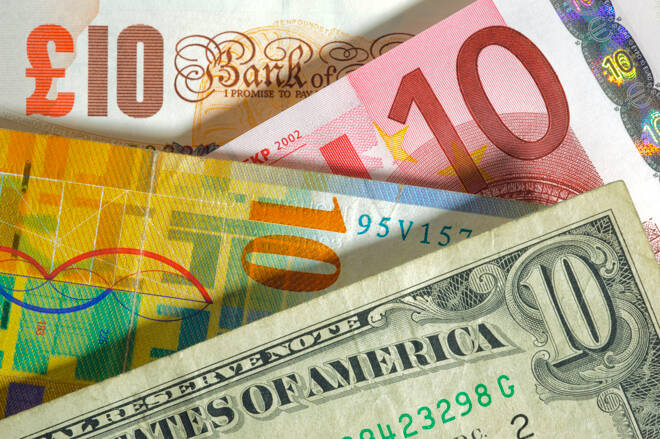Advertisement
Advertisement
Economic Data Puts the EUR, the Loonie, the Pound, and the Greenback in the Spotlight
By:
It's a busy day ahead on the economic calendar, with EUR, the Loonie, the Pound, and the Greenback in focus.
Earlier in the Day:
It’s was a busy start to the day on the economic calendar this morning. The Kiwi Dollar, the Japanese Yen, and the Aussie Dollar were in action early on.
For the Kiwi Dollar
The producer input price index ended the 4th quarter flat, following a 0.6% increase in the 3rd quarter of last year.
According to NZ Stats,
Highlighted input industries:
- Dairy product manufacturing increased by 2.2%, while meat and meat production manufacturing fell by 0.8%.
- Petroleum and coal product manufacturing slid by 5.5% in the quarter.
The Kiwi Dollar moved from $0.72242 to $0.72187 upon release of the figures. At the time of writing, the Kiwi Dollar was down by 0.06% to $0.7217.
For the Japanese Yen
Inflation and private sector PMI figures were in focus this morning.
In January, deflationary pressures softened, with core consumer prices falling by 0.6% year-on-year. Core consumer prices had fallen by 1.0%, year-on-year, in December. Economists had forecast a 0.7% decline.
Consumer prices also fell by 0.6%, year-on-year, following a 1.2% decline in December.
The Japanese Yen moved from ¥105.653 to ¥105.673 upon release of the figures that preceded prelim private sector PMIs for February.
In February, the manufacturing PMI increased from 49.8 to 50.6, while the services PMI fell from 46.1 to 45.8.
According to the prelim Markit survey,
- Service sector conditions deteriorated further, with new orders, weighed by weak domestic demand, seeing a strong decline.
- By contrast, the manufacturing sector saw a pickup in new orders, supported by a rise in new export orders. New export orders had fallen in January.
- Across the private sector, employment rose for the first time in 12-months. While there was a weaker decline in the manufacturing sector, service sector firms increased payrolls.
- Businesses were optimistic that business conditions would improve in the next 12-months. Hopes that an end to the COVID-19 pandemic would induce a recovery in domestic and foreign demand drove optimism.
The Japanese Yen moved from ¥105.711 to ¥105.710 upon release of the figures. At the time of writing, the Japanese Yen was down by 0.02% to ¥105.71 against the U.S Dollar.
For the Aussie Dollar
Prelim retail sales figures for January were in focus.
According to the ABS, retail sales increased by 0.6% in January. In December, retail sales had fallen by 4.1%.
- Food retailing sales increased by 1.8%, reversing a 1.7% decline from December.
- There were declines in clothing, footwear, and personal accessory retailing, household goods retailing, and department stores, however.
- A 3-day lockdown in Brisbane weighed on the three retail sectors in January.
- Compared with January 2020, retail sales were up by 10.7%.
The Aussie Dollar moved from $0.77695 to $0.77679 upon release of the figures. At the time of writing, the Aussie Dollar was up by 0.04% to $0.7771.
The Day Ahead:
For the EUR
It’s a particularly busy day ahead on the economic calendar. Prelim private sector PMI figures for France, Germany, and the Eurozone are due out later today.
Expect plenty of influence from the February numbers. While there’s concern over the services sector, the manufacturing sector will need to continue to perform.
Any weaker manufacturing numbers and the EUR will likely come under pressure. New orders and sentiment towards pricing will likely be key areas of focus.
At the time of writing, the EUR was up by 0.02% to $1.2095.
For the Pound
It’s a busy day ahead on the economic calendar. January retail sales figures are due out along with prelim private sector PMI numbers for February.
The retail sales and services PMI figures will likely be the key drivers.
CBI industrial trend orders for February are also due out but will likely have a muted impact on the Pound.
At the time of writing, the Pound was down by 0.04% to $1.3970.
Across the Pond
It’s another busy day ahead on the economic calendar. Key stats include February’s prelim private sector PMI numbers and housing sector data.
The services PMI will be the main area of interest on the day.
At the time of writing, the Dollar Spot Index was down by 0.07% to 90.532.
For the Loonie
It’s a relatively busy day on the economic data front. Retail sales figures for December are due out later today.
With economic data on the lighter side in the week, we can expect plenty of Loonie sensitivity to the numbers.
From elsewhere, private sector PMI numbers will also influence crude oil prices and ultimately the Loonie.
At the time of writing, the Loonie was down by 0.01% to C$1.2680 against the U.S Dollar.
For a look at all of today’s economic events, check out our economic calendar.
About the Author
Bob Masonauthor
With over 28 years of experience in the financial industry, Bob has worked with various global rating agencies and multinational banks. Currently he is covering currencies, commodities, alternative asset classes and global equities, focusing mostly on European and Asian markets.
Advertisement
